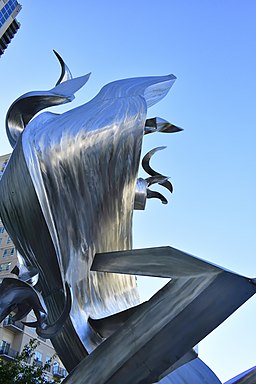
Welcome! In this guide, you'll find resources and strategies you can use as you create your own syllabus of world literature, for ENGL BC3204, World Literature Revisited (Professor Akbari). 
Please feel free to book an appointment with me on my calendar page, for further support with your research!
Image: Hunt, Richard. Spiral Odyssey (sculpture installed at Romare Bearden Park in Charlotte, North Carolina). Photograph by Aidan Hunt. Via Wikimedia Commons. CC0 1.0 (public domain).
LINK TO OUR GROUP KEYWORD CLOUD
Here are some tips for finding search terms. It's a great idea to start thinking about these before you search in catalogs, databases, and other search tools.